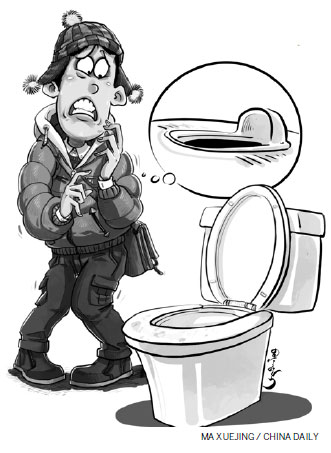Some media outlets in Hong Kong recently reported that many tourists from the Chinese mainland damage or soil Western-style toilets in US national parks such as Yellowstone, Grant Teton and Jackson Hole by squatting on them to relieve themselves. Although the reports provide little detailed information, they accuse mainland tourists of improper behavior while traveling overseas.
Not flushing a toilet after use or squatting on a commode, or Western-style toilet, to relieve oneself is indeed unhealthy behavior. But like many cities in China, especially tourists spots, that started equipping their public lavatories with Western-style toilets along with the squat toilets after launching reform and opening-up, Western countries too should stop being "condescending" toward people from the East and start providing squat toilets in their public and restrooms to cater to the needs of tourists.
The use of commodes started in the 1800s in the United Kingdom, where the advent of indoor plumbing and water closets made it possible for households to afford the more expensive toilets which only royal families and the physically challenged used before. In British department stores, however, special footstools became a popular commodity when people grudgingly accepted the Western-style toilet, because they could rest their feet on the footstools while sitting on a pedestal pan to imitate the squat posture.
Rich families in the British colonies around the world started using commodes over the following decades despite its health drawbacks. Yet it is still deemed a "modern" way of life distinguishing the advanced and enlightened West from the backward East.
Many physicians blame commodes for the high incidence of many serious ailments of the colon and appendicitis in Western or westernized societies. Humans, like the other primates, around the world used to relieve themselves in the squatting position before the Victorian Age. Even today infants instinctively squat to relieve themselves.
Many medical experts still believe that squat toilets make bowel movement and relieving easier and more complete, and prevent fecal stagnation better than commodes. Moreover, squat toilets protect the nerves that control the prostate, bladder and uterus from overstretching and damage.
Some Western tourists complain about the squat toilets in China as if they are a symbol of backwardness even if they are clean and dry. But unlike such Westerners, an increasing number of Chinese are comfortable with both types of toilets. The only thing they are bothered about is the hygienic condition of public toilets.
Japan was the most popular destination for Chinese tourists last year. And more than 5 million Chinese have already visited Japan this year, double the number of last year, despite the diplomatic tensions between Beijing and Tokyo over the dispute in the East China Sea. But few Chinese tourists have been accused of squatting on Western-style toilets in Japan, because public toilets in that country are invariably spotless and provide users with sufficient means and materials to sterilize the toilet seats.
More than 120 million Chinese are expected to travel abroad, spending nearly $200 billion, this year. The two figures have shown an annual increase of about 12 percent in recent years.
If developed countries and regions are really concerned about catering to people from China, the largest single source of tourists in the world, they have to improve the hygienic condition of their public lavatories and equip them with some squat toilets, especially in places frequented by Chinese tourists in large numbers.
Such services are an important aspect of a place's attraction. If Chinese tourists find clean squat toilets along with equally clean Western-style toilets in a place, they would develop a special liking for the place and its people.
That Hong Kong, which used to be the most popular destination for mainland tourists, has seen a 50 percent decline in the number of visitors from the mainland this year because of a poorly-regulated tourism market and worsening travel experiences should serve as a lesson for other tourist destinations favored by mainland tourists.
The author is a writer with China Daily. liyang@chinadaily.com.cn

(China Daily 11/21/2015 page5)
